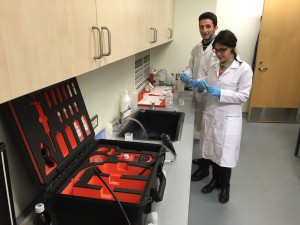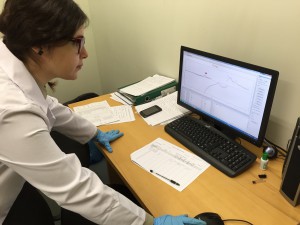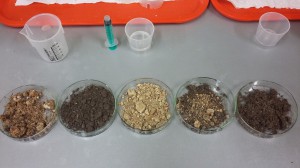AUA Center for Responsible Mining Publishes Results of Soil and Drinking-Water Testing
YEREVAN, June 29, 2016 – The AUA Center for Responsible Mining published reports providing results of independent soil and drinking water assessments in the Lori region. Last November, soil and water samples were collected from three kindergartens and two primary schools in Akhtala; from five kindergartens and two primary schools in Alaverdi; and from one school in Armanis. The soil samples collected were tested for concentrations of arsenic, copper, cadmium, mercury and lead. The water samples were tested for arsenic, arsenic (III), cadmium, copper, lead, mercury, zinc, manganese, aluminum, bor, chromium (VI), iron and nickel. The results were compared against Armenian and international soil standards. After compiling an official report, researchers then presented their findings and discussed possible solutions with community leadership and school directors from the region.
Key Findings
Heavy metal standards were met in the tested drinking water from all surveyed communities.
Arsenic exceeded the Armenian Soil Standard (SS) (and almost all international comparatives) in all surveyed communities. It is our recommendation that soil on the premises of schools should be kept to higher soil standards. In addition, there is need for a national discussion to update the country’s soil standard for arsenic.
Copper concentrations in all soil samples exceeded Armenian SS. In all communities surveyed, most soil samples exceeded international standards. In Alaverdi specifically, all collected samples exceeded international standards.
Lead is a concern in all communities. Based on international research on lead contamination in soil and background levels, the amounts detected in Akhtala, Alaverdi and Armanis raise immediate alarm for children’s health due to lead toxicity. Lead toxicity can be detrimental to childhood development.
The AUA Center for Responsible Mining recommends that playgrounds should be covered by surface materials that reduce children’s exposure to soil and dust containing heavy metals of concern.
The full reports are available here.
In the coming month, the AUA Center for Responsible Mining will begin publishing the results of the soil tests from the schools and kindergartens in: Kapan; Qajaran; Agarak cities and Syunik; Artsvanik; Achanan; and Kavart rural communities.
AUA Center for Responsible Mining Published Results of Soil and Drinking-Water Testing in Kindergartens and Schools of Ararat City
Yerevan, May 10, 2016 – The AUA Center for Responsible Mining published the report providing the results of independent soil and drinking water assessment in the city of Ararat. In October last year, soil and water samples were collected in the city’s three kindergartens and five schools, where a total of 2,347 children study.
“We decided to collect samples in schools and kindergartens because young children are often directly in contact with the ground when they’re playing… Therefore, they are at a higher risk of exposure to heavy metal compared to adults” explained the CRM’s Mining Community Monitoring and Outreach Coordinator, Lena Nazaryan, upon presenting the findings to the school and kindergarten directors assembled at the Ararat city council.
In the last few months, the soil samples collected in the schools and kindergartens were tested for concentration of arsenic, copper, cadmium, mercury and lead. The water sample was tested for arsenic, arsenic (III), cadmium, copper, lead, mercury, zinc, manganese, aluminum, bor, chromium (VI), iron and nickel. The results were then compared with the Armenian soil standard as well as with international soil standards.
The researchers put together their final report last month, and traveled to Ararat on May 10th to present their findings and discuss possible solutions with the mayor, and well as with the school and kindergarten directors.
Key Findings
High levels of heavy metal were not detected in the drinking water. This finding was expected, since the drinking water in the city of Ararat comes from the Garni source, which is located far away from mining and industrial activities.
Arsenic is a heavy metal of concern in the soil samples collected. Arsenic concentrations in all soil samples exceeded the Armenian Soil Standard (SS) and in some samples exceeded Canadian, Swedish and US Environmental Protection Agency (US EPA) standards.
Copper concentrations in soil were also found to be high, but evidence suggest it won’t pose a health risk at that level. Similarly, the amount of lead detected in soil samples does not raise immediate alarm.
The CRM recommended that playgrounds be covered by surface materials (asphalt, concrete or rubber) in order to minimize children’s exposure to heavy metal.
The full report is available here.
It is now up to the local actors in Ararat – the city council, as well as the school and kindergarten directors – to decide what should be done. At the meeting on May 10th, Ararat mayor Hayk Haykyan pointed out that the health of their children was of paramount importance, and that they will study the feasibility of covering playgrounds in schools and kindergartens.
In the coming month, the AUA Center for Responsible Mining will begin publishing the results of the soil tests from the schools and kindergartens in Akhtala, Armanis, Alaverdi, Kapan, Qajaran, Agarak cities and Syunik rural community.
AUA Center for Responsible Mining Testing the Soil of Schools and Kindergartens in Mining Communities
Yerevan, January 29, 2016 – In the coming month, the AUA Center for Responsible Mining will begin publishing the results of the soil tests from the schools and kindergartens in 5 mining or mineral processing communities throughout Armenia, starting with the City of Ararat. The City of Ararat is home to the Sotq gold processing plant and its tailings facility as well as the Ararat Cement Factory. Report on each community is expected to be release at monthly intervals.
The studies, conducted as deliverables for ONEArmenia’s “Let’s Protect Armenia from Toxic Pollution” crowd-funding campaign, will show the level of heavy-metal pollution in soil samples collected. The research started in 2015 when the Organization and Security Cooperation in Europe’s (OSCE’s) Yerevan office delivered the environmental testing equipment it had pledged during ONEArmenia’s campaign. Since receiving the equipment, the AUA Center for Responsible Mining has:
- – Recruited specialists Lena Nazaryan, Liana Margaryan, and Vardan Hayrapetyan to organize and conduct testing in the communities;
- – Mapped 150 communities that are within 5 kilometers of a mining, metal processing, or mineral tailings facilities (see the maps and list here);
- – Established contacts and received permissions from government agencies to enter school and kindergarten properties from 8 communities. Permission to enter schools and kindergartens are available for Ararat, Alaverdi, Akhtala, and Armanis. Permission to enter kindergartens are available for Kapan, Kajaran, Agarak and Syunik Village. Permission to enter schools for the Syunik Marz is pending final discussions with the regional government (see permissions here);
- – Developed protocols for sampling and testing (see the protocols here);
- – Certified its lab equipment by the National Institute of Metrology (see the certificates here);
- – Set up an international Technical Advisory Board; and
- – In the months of October through November 2015, collected 175 samples from 34 schools and kindergartens across 5 mining and mineral processing communities. The Center plans to sample soil in the 3 additional communities and schools in the Syunik Marz in spring 2016.
The community and school-level studies to be released will report on the presence of arsenic, mercury, lead, cadmium, and copper in soil. These are the metals that our equipment can detect and also ones that are deemed highly toxic to human health. Following the publication of the report, AUA Center for Responsible Mining will begin discussions with schools and communities to address pollution of soil should there be unacceptably high levels.
 |
|
 |
|
Vardan Hayrapetyan, Laboratory Technician & Sarah Ghazarian (MPH ’17), Laboratory Assistant, AUA Center for Responsible Mining |
Various types of soil samples |
Sarah Ghazarian (MPH ’17), Laboratory Assistant, AUA Center for Responsible Mining |
AUA Center for Responsible Mining Meets Kapan’s Community to Present Its Activities and Goals
KAPAN, Armenia- From June 29 through July 1, AUA Center for Responsible Mining in cooperation with World Bank delivered a presentation for local NGOs and local government bodies about the Extractive Industries Transparency Initiative (EITI) and the projects of the AUA Center for Responsible Mining in the Kapan Aarhus center.
Alen Amirkhanian, director of the AUA Center for Responsible Mining presented the mission of the center, its projects and main working directions. Lena Nazaryan, mining community monitoring and outreach coordinator, presented the independent environmental monitoring project in the mining communities, which aims to test the heavy metals in soil, water, and human blood in the neighboring areas of mining communities in Armenia.
Lena Nazaryan noted that first of all the kindergartens and schools of communities with possible soil pollution problems as a result of mining will be selected. “The purpose of the monitoring is conducting independent tests and designing solution options including all stakeholders, if we find any problems. We think that the solution to the problem should be the result of a collective work of out center, the community, mining company and other who would like to be part of the solution”,- said Lena Nazaryan.
For additional information as well as to learn about the future activities of the center please visit crm.aua.am website.
During the meeting participants discussed the goals and expected benefits from Armenia’s joining the EITI.
EITI is an international standard for managing the openness and transparency of income derived from the natural resources. It raises the trust of the investors and financial institutions toward the member country, showing that the government is open and transparent. EITI supports the government in strengthening anti-corruption and transparency projects, sometimes helps to find out the unpaid taxes, supports the dialogue among the government, extractive industry, and the civil society organizations, etc. To learn more about the EITI please visit https://eiti.org/.
The American University of Armenia Center for Responsible Mining (AUA CRM) promotes the creation as well as transfer and adoption in Armenia of best practices in socially, environmentally, and economically responsible mining. AUA CRM works with companies, civil society, and the public sector to achieve this goal.
OSCE delivers environmental equipment fulfilling its pledge during ONEArmenia’s “Let’s Protect Armenia from Toxic Pollution” crowdfunding campaign
YEREVAN — Head of the OSCE Office in Yerevan, Ambassador Andrey Sorokin, donated mobile toxic pollution testing equipment and supplies to the American University of Armenia (AUA) Center for Responsible Mining on May 21, 2015. The donated equipment and supplies are indispensable for collecting data that will inform affected citizens about health risks and allow for advice on how to manage them.
Dr. Armen Der Kiureghian, President of the American University of Armenia, received the equipment, which includes a heavy metals soils analyser, photometers, water analysis instrument, additional kits for soil and water analysis.
The equipment is part of a larger project, a crowdfunding campaign organized by ONEArmenia last year. The aim was to enable the AUA Center for Responsible Mining to conduct independent monitoring of communities for toxic heavy-metal pollution resulting from mining and mineral processing in Armenia.
Within the ONEArmenia’s campaign Let’s Protect Armenia from Toxic Pollution, the AUA Center for Responsible Mining is expected to conduct targeted studies and community-wide assessments in five to eight communities over the coming year. The first studies are expected to start in June 2015.
Mining Pollution Testing Equipment Fundraising Goals Exceeded
On November 14, 2014, ONEArmenia completed a 43-day crowdfunding marathon for the purchase of mining pollution testing equipment that will be housed and used by the American University of Armenia (AUA)’s Center for Responsible Mining.
Through the generosity of close to 300 donors, we raised $31,300, exceeding our target by $1,650. It is hard to put in words how grateful we are for the trust our donors have placed in us.
The crowdfunding campaign was part of a larger $76,000 campaign that would enable purchase of portable and stationary lab equipment and supplies for toxic pollution testing in mining communities. To meet the larger fundraising goal, the international community and the diaspora also stepped in with significant support.
The international organizations contributing to our larger campaign included the Organization for Security and Cooperation in Europe, British Embassy Yerevan, and United Nations Development Programme. In addition, Ms. Linda Shahinian from California and the Acopian Family from Pennsylvania made generous donations to this important effort.
Our success with the crowdfunding campaign is in great part due to ONEArmenia’s dedicated team that brought irreplaceable experience and skills launching and managing this campaign. ONEArmenia not only raised funds but also helped raise awareness on the critical issue of mining pollution in Armenia.
Moreover, none of this would have been possible without the monumental efforts of Mr. John Heffern, the U.S. Ambassador to Armenia, who rallied support from all fronts. He reached out to his friends, to international donors, and to environmental organizations inside and outside of Armenia encouraging them to spread the word. His energy and enthusiasm has been endless, pushing us to expect more from ourselves and aim higher.
With the success of this campaign, communities will now have the tools to independently monitor the levels of toxic, heavy metal pollution in their soil and water. The AUA Center for Responsible Mining will be ready to help them use science and objective analytics to identify and manage their public health and environmental risks. All donors to this campaign, be it with their $5 or $20,000, have collectively made it possible for communities in Armenia to do this.
With deep gratitude,
Alen Amirkhanian
Interim Director, AUA Center for Responsible Mining
Director, AUA Acopian Center for the Environment
The American University of Armenia Center for Responsible Mining (AUA CRM) promotes the creation as well as transfer and adoption in Armenia of best practices in socially, environmentally, and economically responsible mining. AUA CRM works with companies, civil society, and the public sector to achieve this goal. crm.aua.am

